人家课标版B5 Unit 4 Making the News Using language(课件38张)
文档属性
| 名称 | 人家课标版B5 Unit 4 Making the News Using language(课件38张) |

|
|
| 格式 | zip | ||
| 文件大小 | 3.2MB | ||
| 资源类型 | 教案 | ||
| 版本资源 | 人教版(新课程标准) | ||
| 科目 | 英语 | ||
| 更新时间 | 2015-10-23 00:00:00 | ||
图片预览

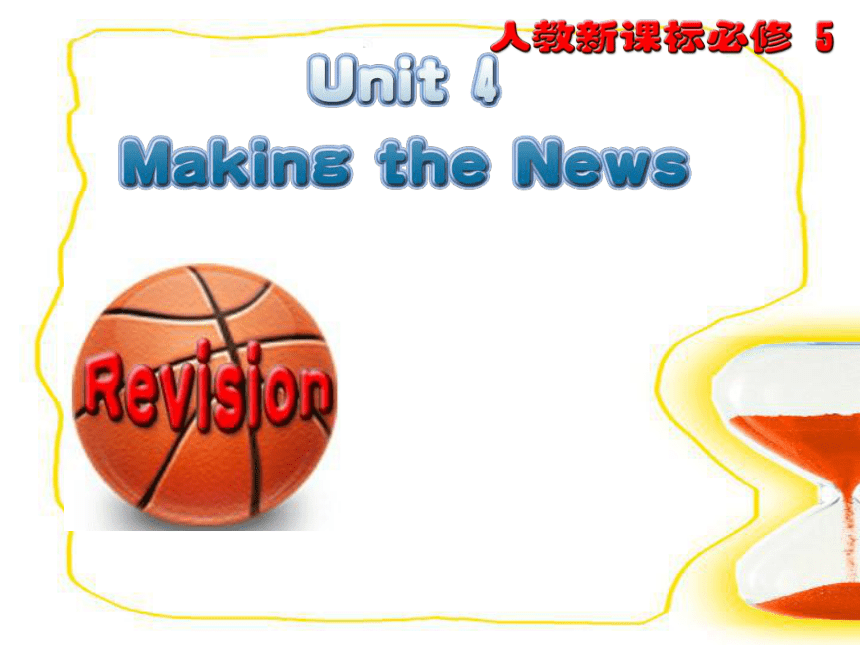
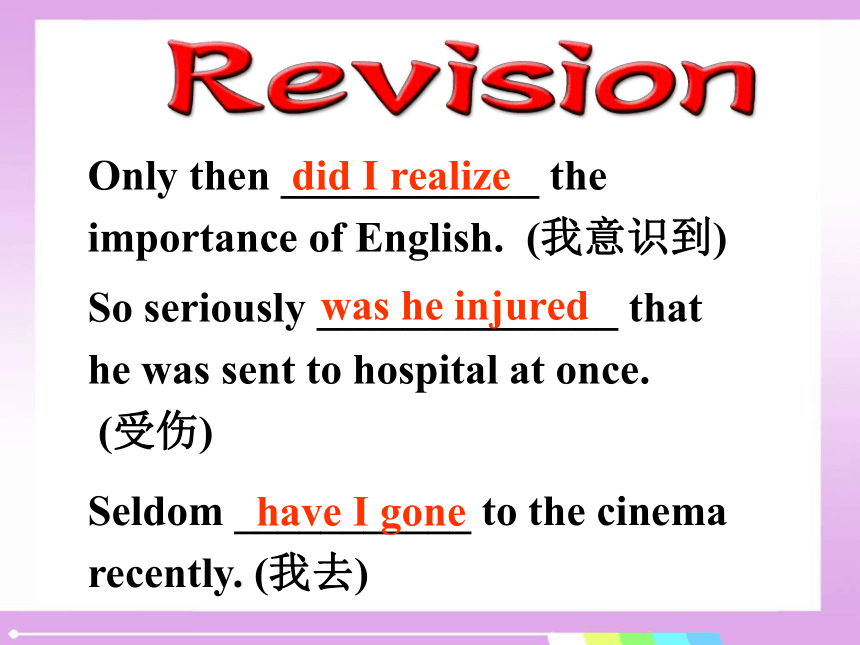
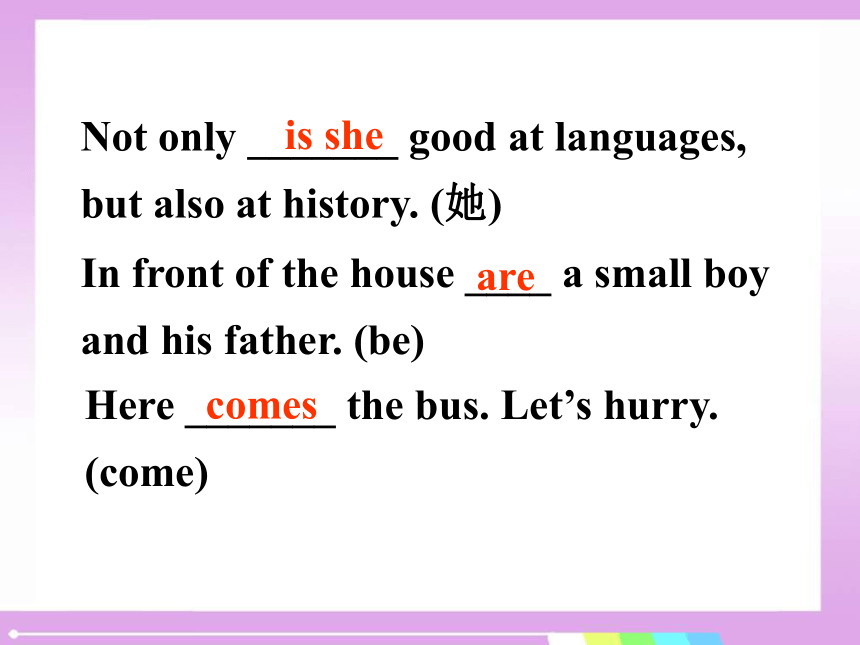
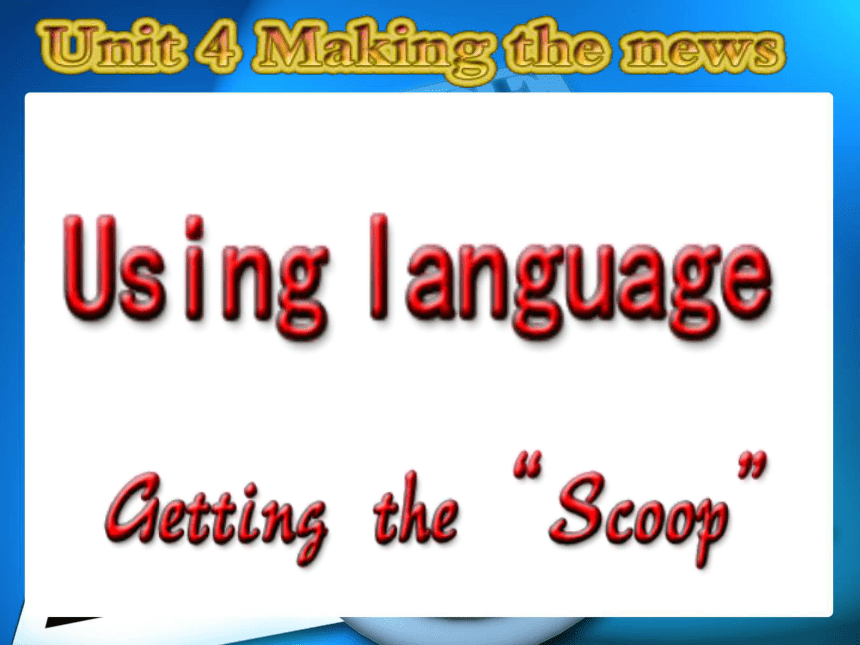
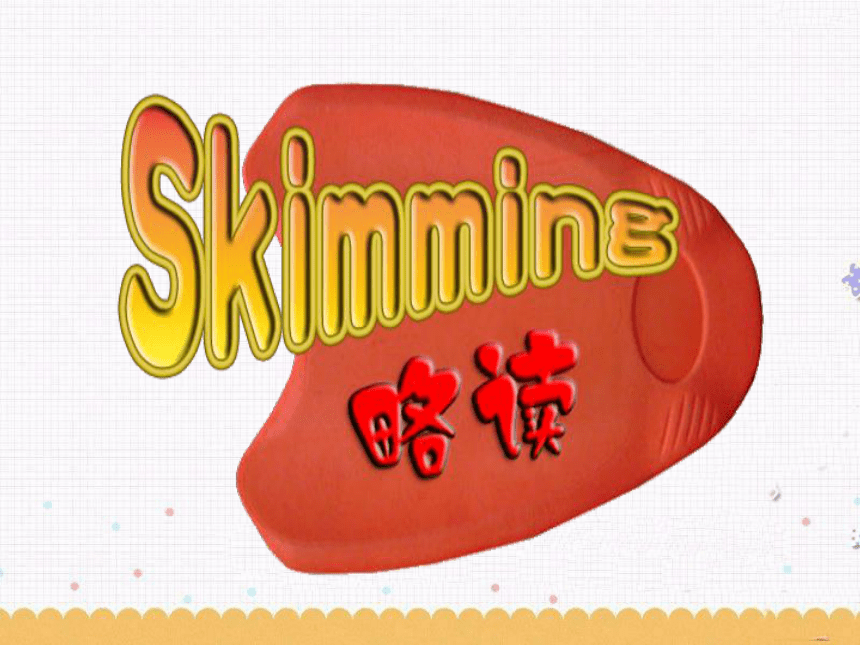
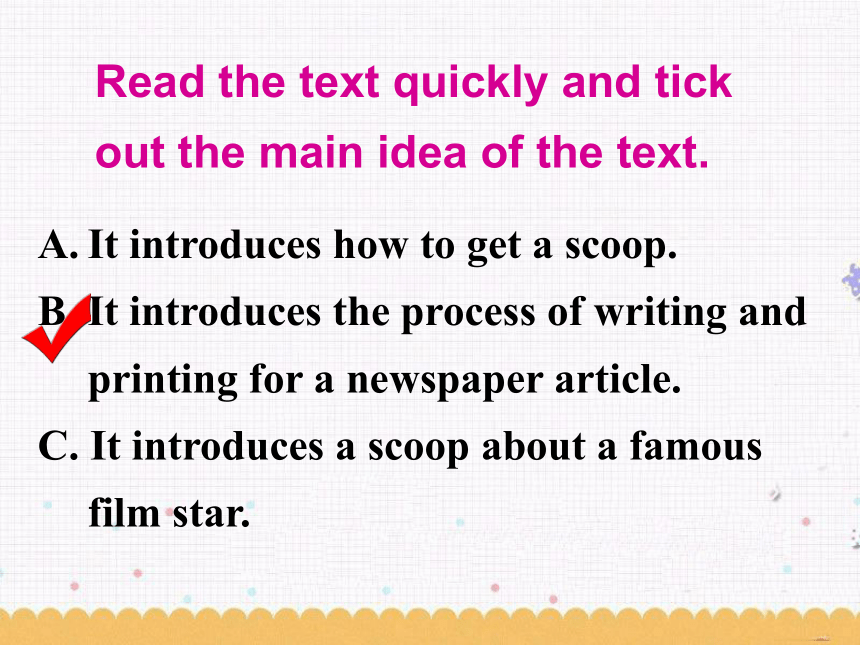
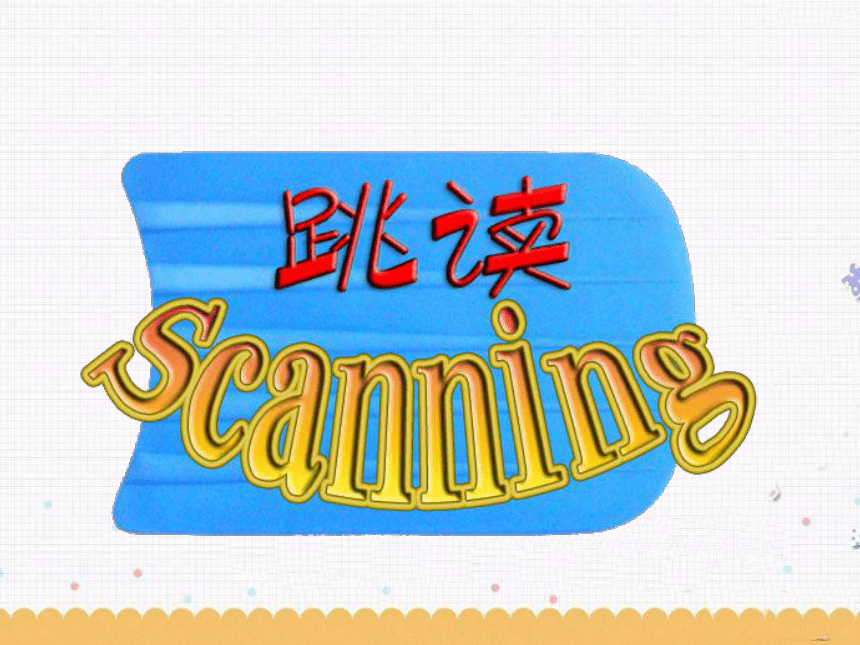
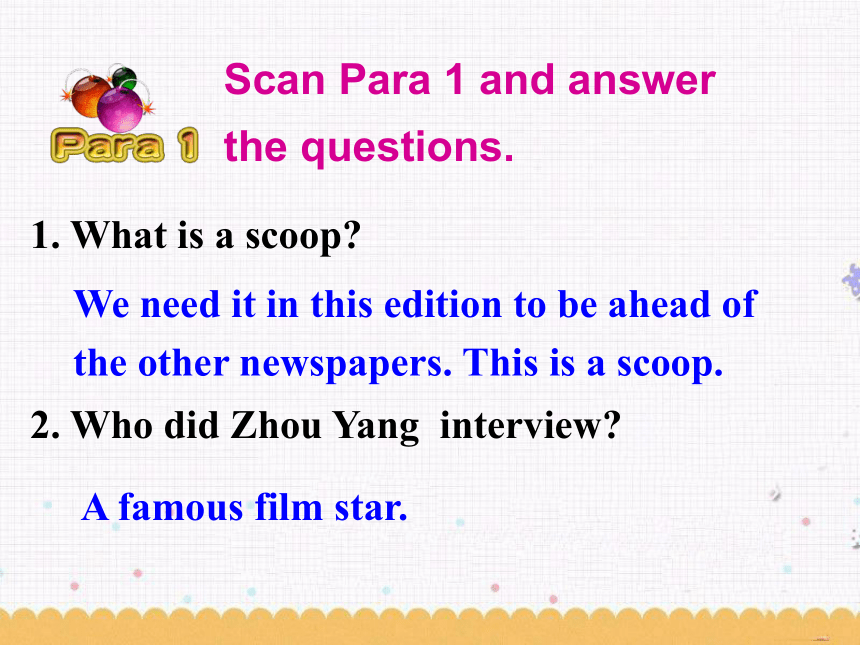
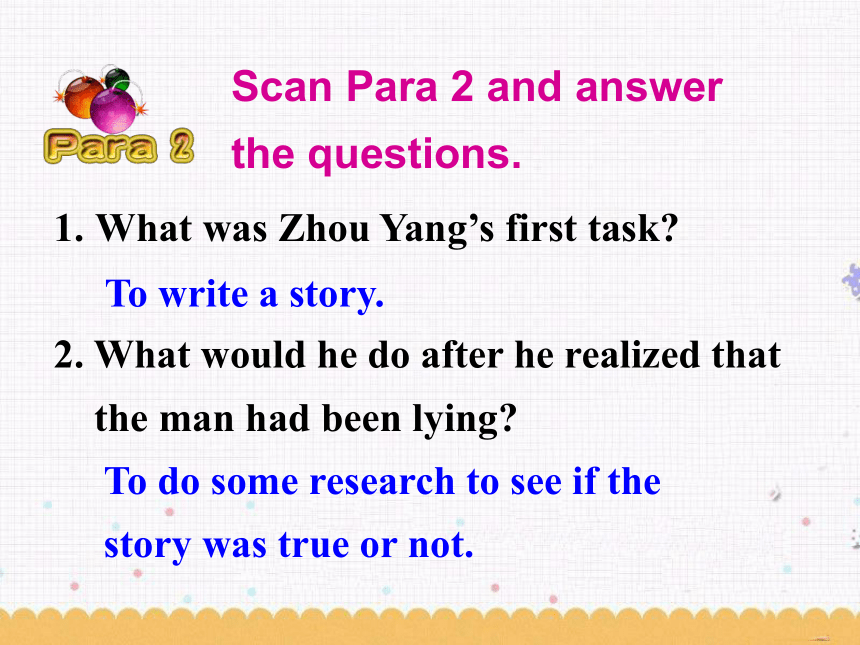
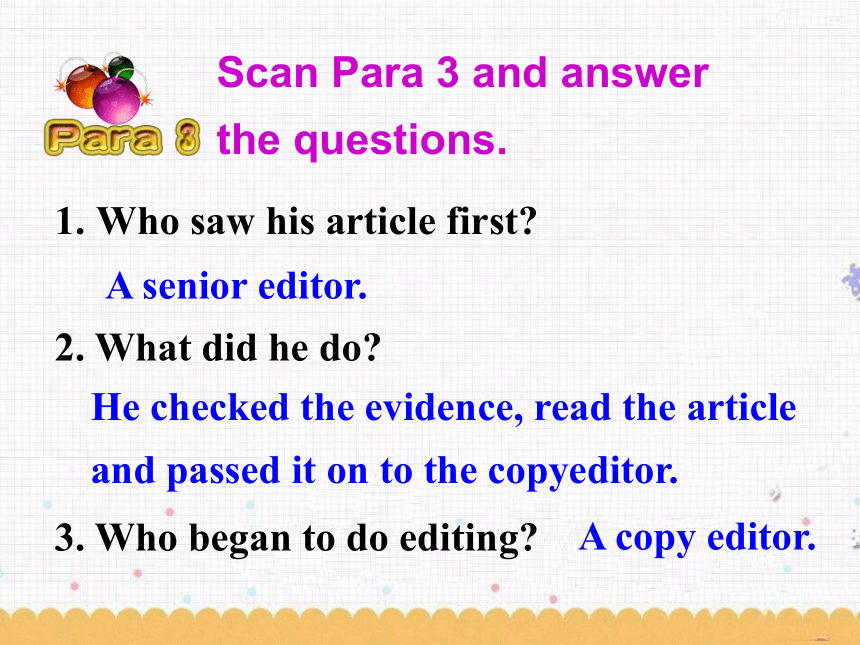
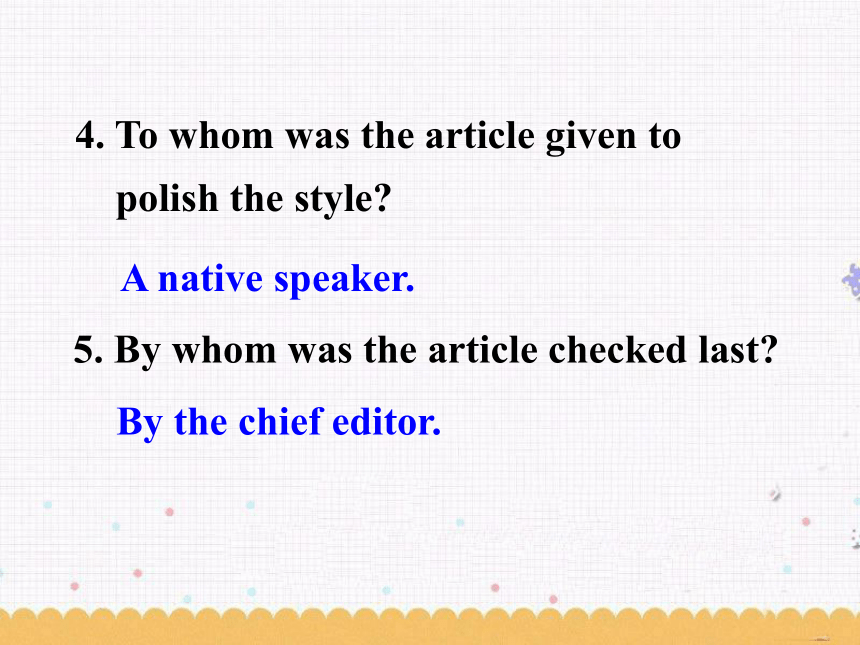
文档简介
课件38张PPT。人教课标
高二 必修 5
Unit 4Only then ____________ the
importance of English. (我意识到)So seriously ______________ that
he was sent to hospital at once.
(受伤)Seldom ___________ to the cinema recently. (我去) did I realize was he injured have I goneHere _______ the bus. Let’s hurry.
(come)Not only _______ good at languages,
but also at history. (她) In front of the house ____ a small boy
and his father. (be) is she are comesIt introduces how to get a scoop.
B. It introduces the process of writing and printing for a newspaper article.
C. It introduces a scoop about a famous film star.Read the text quickly and tick
out the main idea of the text.Scan Para 1 and answer the questions.1. What is a scoop?
2. Who did Zhou Yang interview?We need it in this edition to be ahead of the other newspapers. This is a scoop.A famous film star.Scan Para 2 and answer the questions. What was Zhou Yang’s first task?
2. What would he do after he realized that
the man had been lying?To write a story.To do some research to see if the
story was true or not.Scan Para 3 and answer the questions. Who saw his article first?
2. What did he do?
3. Who began to do editing?A senior editor.He checked the evidence, read the article and passed it on to the copyeditor.A copy editor.5. By whom was the article checked last?By the chief editor.4. To whom was the article given to
polish the style?A native speaker.Scan Para 4 and answer the questions. What did they need to do the first stage
of printing?
2. What did Zhou Yang wait excitedly for?All the stories and photos, film negatives.His first edition of newspaper. Read the passage to work out the
writing and printing process for an article. Then complete the flow chart below.You do some
research to
see if the story
is true or not. You are going
to an ________
to get the information for your story.You begin to
_____ the story
using the notes
from the interview.write interviewYou give the
article to a ______ editor to check and a ____-editor to do editing.seniorcopy The article is
given to a _____
_______ to check
and improve.nativespeaker The article is checked /
approved by the ___________.chief editorAll the stories and photos are set and the colour negatives for the printing are made ready.The first
______ of the
newspaper is
________.editionprinted2. In pairs make a list of things that the
film star might have done. Compare
your list with another pair and choose
the most interesting idea. Be prepared
to tell it to the class and explain why
the film star would not want others to
know about it. Suggested answers:
He took money but acted badly
in a film.2. He lied about getting drunk at a
restaurant.3. He stole something from a shop
and lied about it.4. He said some rude remarks about
his ex-girlfriend to a journalist.S1: Let’s think about what this person
might have done?
S2: I know! Perhaps he was a film star and
stole from a shop. But then he pretended
he hadn’t.
S3: That’s a good idea. What do you think
he would steal?
S4: Perhaps a gold necklace for his wife.
S2: But how could he pretend he had not
done that if someone saw him?S1: He could pretend it was not him but
somebody else they saw.
S3: But when Li Ming checked his alibi
he found the man was lying. Good---
a great scoop.
S1: Right. So what should our heading be?
S4: Can it be “A film star caught
unexpectedly?”
S3: Yes and the sub-heading could be
“Did he need the money?”S2: So let’s begin. Let’s write our ideas
down first and then we’ll be ready to
do the article.3. Prepare your article, following
the steps below.1) Sort out your two headings: a large one (the main headline) at the top and a smaller one under it.A Film Star Caught Unexpectedly
Did he need the money?2) Sort out the stages in your story:
what the film star did
how you found out
how the film star reacted when you
told him you knew his secret
your opinionwhat the film star did.There has been a strange happening
in a downtown shopping area. A famous
film star, Wang Ping, was caught stealing
a gold necklace yesterday. He went into
a shop and when the jeweler turned his
back Wang Ping took the necklace and
ran out of the shop.how you found him out.The shopkeeper shouted and a crowd
of people gathered. I saw him stealing
with my own eyes and went to tell him
to hand out the necklace. how the film star reacted when you told him you knew his secret.But the film star denied that he had
stolen the necklace. He said it was
someone else who stole the necklace.
But I saw it with my own eyes so I called
the police. The policeman took him to
the police station and he had to admit it.your opinion.In my opinion, a famous star should be honest. I don’t think he really needs the money. He should set a good example to other people. It’s a shame for him to steal things. He ought to be punished. We shouldn’t learn from him. We need it in this edition to be ahead of
the other newspapers. ahead of 在……前面,先于;胜过e.g. Do not go too far ahead of me.
别在我面前领先太远。We’re about 60 years ahead of you.
我们比你们领先60年。The Italian team is 3 points ahead of the
English one. 意大利队领先英国队3分。 1) Hamilton won and is now 21 points
________ me.
汉密尔顿赢了,并领先我21个积分。ahead of 2) We're still a step ________ her.
我们仍然领先她一步了。ahead of 3) As a writer, Sterne was ________ his time.
作为一个作家,斯特恩领先于他的时代。ahead of2. Last of all, the chief editor read it
and approved it.approve “赞成”、“认可”
“满意”、“同意” “批准”、“通过” vi.
approve of vt.
approve1. 公司总裁批准了建筑计划。 误:The company president approved of
the building plans.正:The company president approved
the building plans.表示“批准”、“通过”,此时只用作
及物动词,其后跟宾语时无需任何介词。 2. 我不赞成你同他一起出去。 误:I do not approve you to go out
with him.正:I do not approve of your going
out with him.表示“赞成”、 “认可”、“满意”、
“同意”等, 此时通常是不及物动词,
若需后接宾语,通常要借助介词。
高二 必修 5
Unit 4Only then ____________ the
importance of English. (我意识到)So seriously ______________ that
he was sent to hospital at once.
(受伤)Seldom ___________ to the cinema recently. (我去) did I realize was he injured have I goneHere _______ the bus. Let’s hurry.
(come)Not only _______ good at languages,
but also at history. (她) In front of the house ____ a small boy
and his father. (be) is she are comesIt introduces how to get a scoop.
B. It introduces the process of writing and printing for a newspaper article.
C. It introduces a scoop about a famous film star.Read the text quickly and tick
out the main idea of the text.Scan Para 1 and answer the questions.1. What is a scoop?
2. Who did Zhou Yang interview?We need it in this edition to be ahead of the other newspapers. This is a scoop.A famous film star.Scan Para 2 and answer the questions. What was Zhou Yang’s first task?
2. What would he do after he realized that
the man had been lying?To write a story.To do some research to see if the
story was true or not.Scan Para 3 and answer the questions. Who saw his article first?
2. What did he do?
3. Who began to do editing?A senior editor.He checked the evidence, read the article and passed it on to the copyeditor.A copy editor.5. By whom was the article checked last?By the chief editor.4. To whom was the article given to
polish the style?A native speaker.Scan Para 4 and answer the questions. What did they need to do the first stage
of printing?
2. What did Zhou Yang wait excitedly for?All the stories and photos, film negatives.His first edition of newspaper. Read the passage to work out the
writing and printing process for an article. Then complete the flow chart below.You do some
research to
see if the story
is true or not. You are going
to an ________
to get the information for your story.You begin to
_____ the story
using the notes
from the interview.write interviewYou give the
article to a ______ editor to check and a ____-editor to do editing.seniorcopy The article is
given to a _____
_______ to check
and improve.nativespeaker The article is checked /
approved by the ___________.chief editorAll the stories and photos are set and the colour negatives for the printing are made ready.The first
______ of the
newspaper is
________.editionprinted2. In pairs make a list of things that the
film star might have done. Compare
your list with another pair and choose
the most interesting idea. Be prepared
to tell it to the class and explain why
the film star would not want others to
know about it. Suggested answers:
He took money but acted badly
in a film.2. He lied about getting drunk at a
restaurant.3. He stole something from a shop
and lied about it.4. He said some rude remarks about
his ex-girlfriend to a journalist.S1: Let’s think about what this person
might have done?
S2: I know! Perhaps he was a film star and
stole from a shop. But then he pretended
he hadn’t.
S3: That’s a good idea. What do you think
he would steal?
S4: Perhaps a gold necklace for his wife.
S2: But how could he pretend he had not
done that if someone saw him?S1: He could pretend it was not him but
somebody else they saw.
S3: But when Li Ming checked his alibi
he found the man was lying. Good---
a great scoop.
S1: Right. So what should our heading be?
S4: Can it be “A film star caught
unexpectedly?”
S3: Yes and the sub-heading could be
“Did he need the money?”S2: So let’s begin. Let’s write our ideas
down first and then we’ll be ready to
do the article.3. Prepare your article, following
the steps below.1) Sort out your two headings: a large one (the main headline) at the top and a smaller one under it.A Film Star Caught Unexpectedly
Did he need the money?2) Sort out the stages in your story:
what the film star did
how you found out
how the film star reacted when you
told him you knew his secret
your opinionwhat the film star did.There has been a strange happening
in a downtown shopping area. A famous
film star, Wang Ping, was caught stealing
a gold necklace yesterday. He went into
a shop and when the jeweler turned his
back Wang Ping took the necklace and
ran out of the shop.how you found him out.The shopkeeper shouted and a crowd
of people gathered. I saw him stealing
with my own eyes and went to tell him
to hand out the necklace. how the film star reacted when you told him you knew his secret.But the film star denied that he had
stolen the necklace. He said it was
someone else who stole the necklace.
But I saw it with my own eyes so I called
the police. The policeman took him to
the police station and he had to admit it.your opinion.In my opinion, a famous star should be honest. I don’t think he really needs the money. He should set a good example to other people. It’s a shame for him to steal things. He ought to be punished. We shouldn’t learn from him. We need it in this edition to be ahead of
the other newspapers. ahead of 在……前面,先于;胜过e.g. Do not go too far ahead of me.
别在我面前领先太远。We’re about 60 years ahead of you.
我们比你们领先60年。The Italian team is 3 points ahead of the
English one. 意大利队领先英国队3分。 1) Hamilton won and is now 21 points
________ me.
汉密尔顿赢了,并领先我21个积分。ahead of 2) We're still a step ________ her.
我们仍然领先她一步了。ahead of 3) As a writer, Sterne was ________ his time.
作为一个作家,斯特恩领先于他的时代。ahead of2. Last of all, the chief editor read it
and approved it.approve “赞成”、“认可”
“满意”、“同意” “批准”、“通过” vi.
approve of vt.
approve1. 公司总裁批准了建筑计划。 误:The company president approved of
the building plans.正:The company president approved
the building plans.表示“批准”、“通过”,此时只用作
及物动词,其后跟宾语时无需任何介词。 2. 我不赞成你同他一起出去。 误:I do not approve you to go out
with him.正:I do not approve of your going
out with him.表示“赞成”、 “认可”、“满意”、
“同意”等, 此时通常是不及物动词,
若需后接宾语,通常要借助介词。
